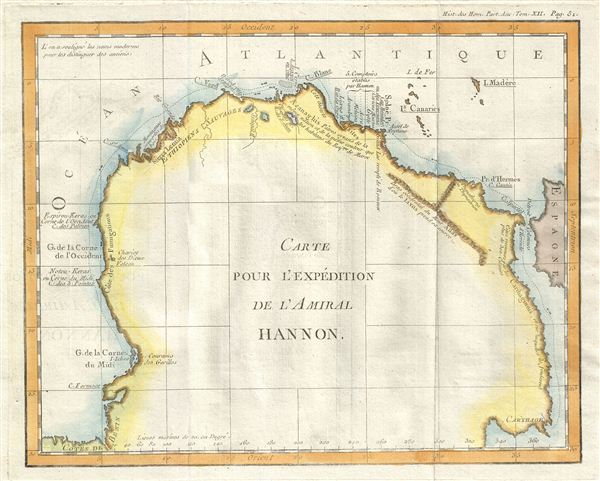This is a fascinating example Jean-Baptiste-Claude Delisle de Sales' 1770 map of western Africa. Oriented to the west, this map covers northwest Africa from the coast of Benin to the Mediterranean Sea. This map depicts the journey of the ancient Carthaginian explorer Admiral Hanno (not to be confused with Hanno the Elder). Between 500 and 480 B.C. Carthage commissioned Hanno with sixty ships and 30,000 sailor s to find (or found) trading colonies on the western coast of Africa. He recorded his expedition on a tablet entitled Periplus and on his return hung it in the temple of Ba'al Hammon (Kronos). The city of Thymiaterion, reportedly founded by Hanno, is identified along with various other locals referenced in the Periplus. This magnitude of Hanno's achievement can be best understood when compared with the struggles of the Portuguese 2000 years later to navigate the same stretch. Equipped with modern ships and advanced navigation techniques, it took Portuguese explorers nearly 100 years of only partially successful attempts to reach the Bight of Benin. Presumably for reference, the cartographer also identifies several more contemporary regions with updated place names, including the Canary Islands, Madeira, Spain, and Sierra Leone, to name just a few. Several rivers, mountains, and other topographical details are also noted. This map was issued as part of Delisle de Sales' Histoire des hommes. Partie de l'Histoire Ancienne. Becasue most of Sales' work was burnt under the censorship of heresy, this volume is exceedingly rare.
Cartographer
Jean-Baptiste-Claude Delisle de Sales or Jean-Baptiste Isoard de Lisle (1741–1816) was a French philosopher, historian, and accused heretic active in the late 18th century. Sales is best known for his publication of the multi-volume opus The Philosophy of Nature: Treatise on Human Moral Nature. The work, among other ideas, challenged the Biblical theory that the earth was created in 4004 BC. Instead, Sales put forth the theory based upon astronomical observations, that the earth was 140,000 years old. Sales' revolutionary ideas caused him to be declared a heretic by the Catholic Church. His publications were subsequently censored and, for the most part, destroyed. As a consequence all of his works are today extremely rare. Sales was also, notably, a close friend of Voltaire who in 1777 visited him in prison, gifting him 500 pounds towards his release. Delisle de Sales is unrelated to the more famous De L'Isle family of cartographers. More by this mapmaker...
Source
Delisle de Sales, Histoire des Hommes. Partie de l'Histoire Ancienne (Paris) 1770.
Very good. Original platemark visible. Minor wear along original folds. Blank on verso.


